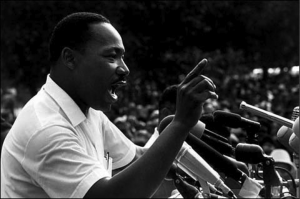 As I reflected on the legacy of Dr. Martin Luther King, Jr. this week, I wondered what he would think about the U.S. health system in 2015. Being a healthcare communications professional, I imagined what Dr. King might say, and what advice he might offer, knowing that despite significant advances in civil rights, race remains a significant factor in determining access to care, quality of care, and health outcomes. Knowing that disparities are particularly acute in the south, where he was raised and where a third of the country lives. According to the Kaiser Family Foundation, Southerners are more likely than those in other regions to be uninsured, less likely to have access to needed health services, and more likely to experience chronic health conditions such as diabetes and heart disease.
As I reflected on the legacy of Dr. Martin Luther King, Jr. this week, I wondered what he would think about the U.S. health system in 2015. Being a healthcare communications professional, I imagined what Dr. King might say, and what advice he might offer, knowing that despite significant advances in civil rights, race remains a significant factor in determining access to care, quality of care, and health outcomes. Knowing that disparities are particularly acute in the south, where he was raised and where a third of the country lives. According to the Kaiser Family Foundation, Southerners are more likely than those in other regions to be uninsured, less likely to have access to needed health services, and more likely to experience chronic health conditions such as diabetes and heart disease.
And while I don’t want to simplify what is a complex issue impacted by a number of factors, how can we allow race to dictate health? And why does the vast majority of published research indicate that minorities are less likely than whites to receive needed services, including clinically necessary procedures, even after correcting for access-related factors, such as insurance status?
Quick sidebar: My youngest daughter has a common refrain whenever anyone in the family complains about trivial things – “sounds like a first world problem to me.”
While racial disparities are abhorrent in any country, they certainly should not be a “first world” problem. So what can we learn from Dr. King? What key messages can we borrow from his famous I Have a Dream speech and apply to the issue of disparities in health and health care?
Here’s what I discovered as I re-read that famous speech from August 28, 1963:
“It would be fatal for the nation to overlook the urgency of the moment.”
According to the Kaiser Family Foundation, 30% of direct medical costs for Blacks, Hispanics, and Asian Americans are excess costs due to health inequities, and the economy loses an estimated $309 billion per year due to the direct and indirect costs of disparities. We cannot fully address the issue of rising health costs and eliminating health care waste, without addressing the issue of health disparities.
“We cannot walk alone.”
Eliminating health disparities will require a collective effort. It cannot be accomplished by the federal government alone, through Health and Human Services and its vision for “a nation free of disparities in health and health care.” Nor by state governments alone, through Medicaid expansion and other models to address regional health needs. Nor by our academic medical centers alone, which act as a safety net and develop innovative programs designed to meet the needs of vulnerable populations. It will take a collective effort, including government, providers, employers, payors, families and individuals.
“And if America is to be a great nation, this must become true.”
If we are truly interested in impacting population health, we cannot ignore racial disparities. And as we learned from the recent Ebola crisis, population health crosses state lines and even national borders. The health of a nation depends on the health of its people. And a healthy population drives a healthy economy. True population health includes identifying and eliminating racial disparities.
What about Dr. King’s speech inspires you to eradicate health disparities? What is your organization doing to contribute to a nation free of disparities in health and health care? Share your thoughts below.
